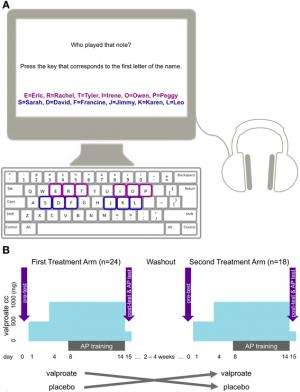January 7, 2014 weblog
Research suggests Valproate pill could give anyone perfect pitch

(Medical Xpress)—A team of researchers at Harvard University has found that the drug Valproate (valproic acid—normally used as a mood stabilizer) appears to offer a reset switch of sorts—those that take it find a part of their brain, the researchers say, resorting to that of a child—open to suggestion—and able to allow for learning to gain (absolute) perfect pitch. In their paper published in Frontiers in Systems Neuroscience, the researchers describe a study they undertook of Valproate, where mice given the drug were able to develop skills generally only possible learned as pups and where human volunteers were able make gains in learning to have perfect pitch.
Perfect pitch is described as the ability to identify individual notes when heard and then to repeat them. A person with such an ability can tell which piano key is pressed without looking, for example, or to sing the note C, for example without hearing it first. People with such an ability (just 0.01 percent of the general population) are often believed to possess certain innate musical talents such as learning to play an instrument simply by listening to songs played on it by other people—learning by ear, as it's popularly known. Prior research has found that perfect pitch is an ability that is learned very early in life.
In this new effort, the researchers studying Valproate—which is an HDAC inhibitor—found that giving it to adult mice caused them to be able to learn things that mice normally are only able to learn during the first few weeks of life—when the brain still has plasticity. In humans, perfect pitch is believed to come about either naturally or due to certain stimuli during the same period of plasticity (when they are four to six years old)—once learned, it becomes permanent.
Scientists have studied perfect pitch for centuries hoping to find a way to allow those who don't come by it "naturally" to do so through some new means. In this new study, the researchers enlisted 24 young male volunteers with little or no musical backgrounds—none of them had perfect pitch. After taking Valproate for 15 days along with watching videos that are thought to promote learning perfect pitch, all of the volunteers (save for those given a placebo) performed better than chance on standard tests to determine perfect pitch. And while none of the volunteers actually gained perfect pitch, the study does indicate that Valproate can help people get there.
Unfortunately, due to side-effects, it's not recommended that people take Valproate regularly or in long dosage periods, thus it's not possible at this time to determine if additional trials would result in increased learning, leading perhaps, to actual perfect pitch.
More information: Valproate reopens critical-period learning of absolute pitch, Front. Syst. Neurosci., 03 December 2013 DOI: 10.3389/fnsys.2013.00102
Abstract
Absolute pitch, the ability to identify or produce the pitch of a sound without a reference point, has a critical period, i.e., it can only be acquired early in life. However, research has shown that histone-deacetylase inhibitors (HDAC inhibitors) enable adult mice to establish perceptual preferences that are otherwise impossible to acquire after youth. In humans, we found that adult men who took valproate (VPA) (a HDAC inhibitor) learned to identify pitch significantly better than those taking placebo—evidence that VPA facilitated critical-period learning in the adult human brain. Importantly, this result was not due to a general change in cognitive function, but rather a specific effect on a sensory task associated with a critical-period.
© 2014 Medical Xpress



















